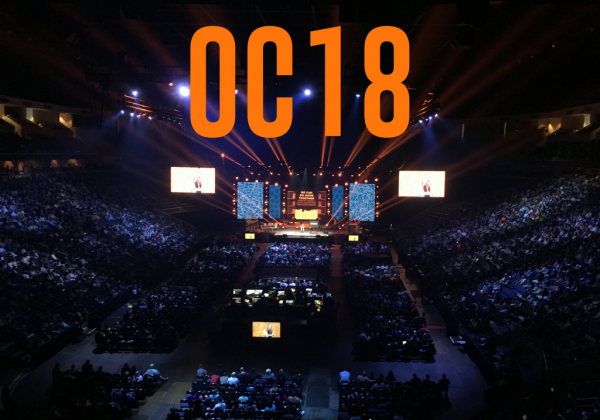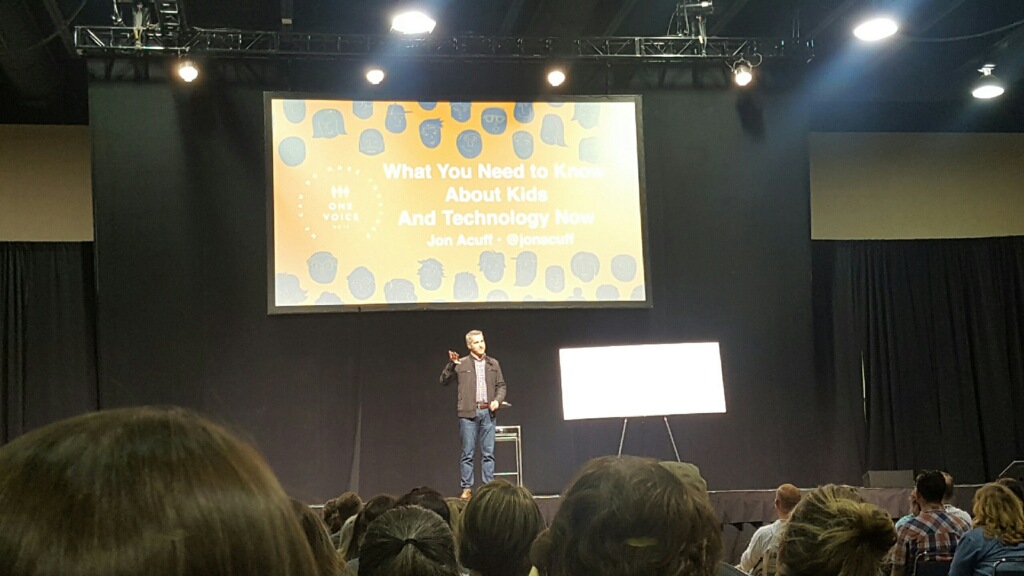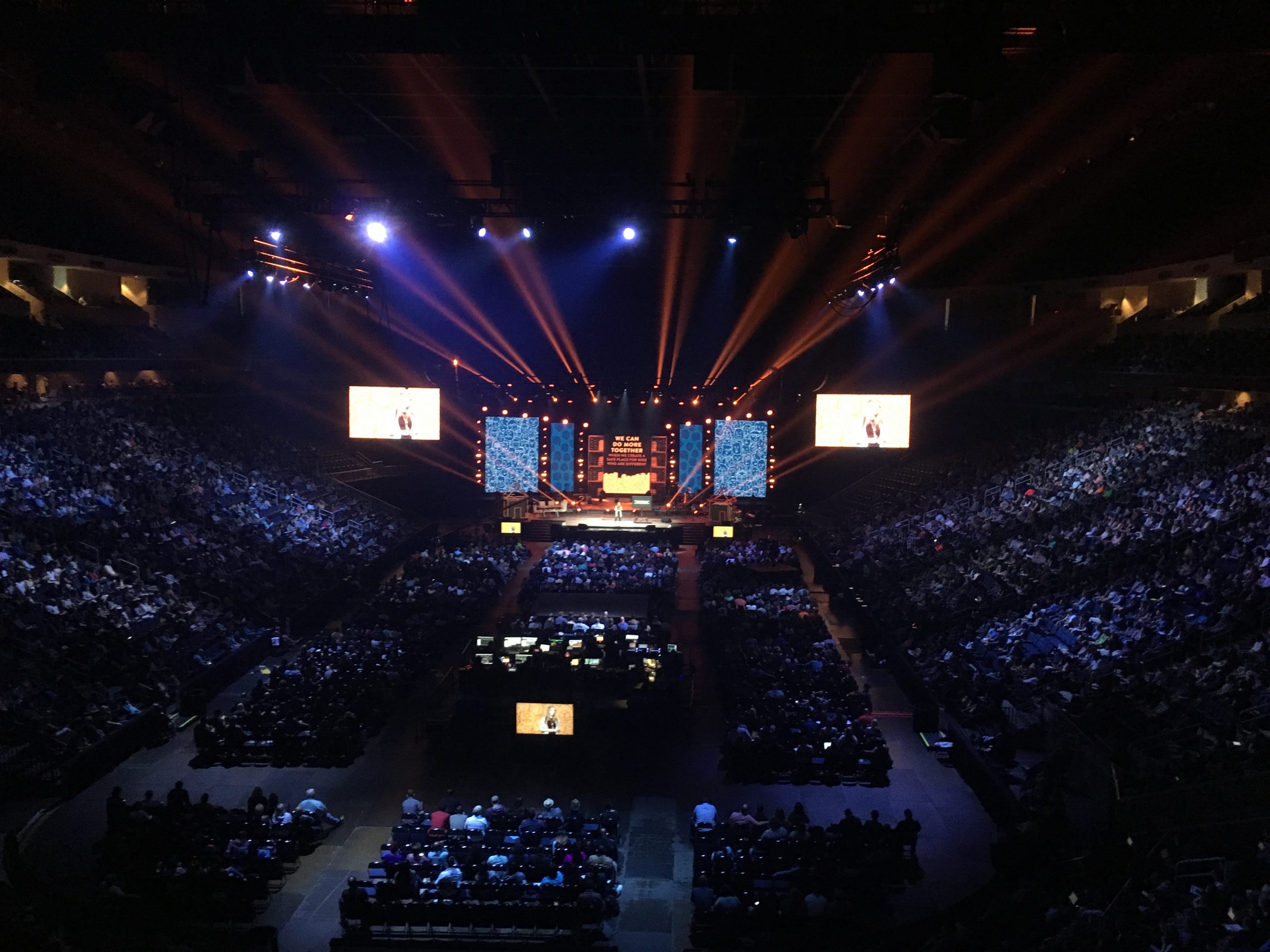
I’m kind of a conference junkie, so when I had the chance to attend Orange Conference 2018 with our church, I couldn’t say no!
Orange Conference 2018 focused on how we can do more together. I’m not very familiar with Orange’s curriculum, but I’m a big fan of their theory of ministry that encourages and equips parents through each phase of a child’s life.
All of the breakouts and main speakers were great, and I took PAGES of notes, but my biggest takeaway from the conference was the connections I made with other kidmin leaders and bloggers. I am an introvert, so the idea of small talk and meeting new people usually makes me want to hide. But I pushed myself out of my comfort zone to be intentional about meeting people, and I am so happy I did! Special shout out to Dana, Jae, Tessa, and Katy for great conversations, whether they lasted 3 minutes or 3 hours.
As for the pages of notes, here are my lessons learned, favorite quotes, and important takeaways from my favorite breakouts and main sessions…

Breakout Sessions
CAUGHT IN BETWEEN: RE-ENGAGE YOUR PRETEENS – DAN SCOTT
This breakout was basically an overview of Dan Scott’s new book with the same title. I don’t usually enjoy breakouts that are just outlines of books because I could have just paid the $15 and bought the book rather than pay for the whole conference, so I won’t share a lot of my notes on this one. But here’s the gist:
Preteens are caught in between childhood and adolescence, in between expectations and reality, and in between information and understanding. They’re not what they were and they’re not what they will be. The mental changes in this stage are the most important because they literally have the brain of a 3-year-old as the brain experiences neurological pruning. Because of the varying rates of development, you may have some preteens that are thinking concretely and some that are thinking abstractly. Stress from school, extracurriculars, and culture increase during this phase of life, and while we can’t change this reality, we can respond to it.
So we have to catch them with a unique environment, consistent volunteers, effective programs, and intentional parents. Give preteens a space and experience of their own. Emphasize small groups, and teach them in a way that builds critical thinking, fosters emotional intelligence and empathy, and that’s relevant. The lesson isn’t over until the preteens have the tools they need to apply it to their lives.
Preteens are the church right now. Let them be.
For a full explanation, check out Dan Scott’s book: Caught in Between.
HELPING LOCAL SCHOOLS WIN – LESLIE BOLSER
Five Ways to Help Schools Win:
- Level the playing field. Ask: What is a win for your school? What is a win for your church? Do these wins intersect, and does it matter? If there’s a benefit only for the school, is that enough? Action step: Show credibility by discovering the school’s win and look for metrics to show impact of your proposed idea.
- Practice and prepare. Do your homework and be ready to serve however the school needs you to. Under promise and over deliver. Action step: Build trust by doing the small things and always following through.
- Know the lingo. Be careful of the language you use when talking with teachers and school administrators (for example, “loving on kids” sounds great in the church world, but sounds creepy in the public school world). Action step: Gain wisdom. Talk to teachers in your congregations, and create a glossary of words to use (and not to use) for you and your team.
- Play by the rules. Don’t circumvent locked doors, physical or metaphorical. Don’t go into schools with the agenda to grow your church. Think of the burden on kids if you show up for their stuff expecting them to show up to your stuff. Action step: Respect boundaries, clarify the rules, and understand school culture and demographics.
- Tell the Story. Spread the word about what you’re doing in your congregations and encourage others to get involved. Action step: Gain momentum.
See the full notes outline from Core Essentials here.
WHAT YOU NEED TO KNOW ABOUT KIDS AND TECHNOLOGY NOW – JON ACUFF
This was by far my favorite breakout, and not just because Jon Acuff is hysterical. This one was just so practical and helps remind leaders and parents that technology isn’t going anywhere, so we might as well use it to our advantage. We went through each phase from birth to high school graduation and talked about what responsible technology usage looks like in each phase.
Download the overview of technological responsibility from Orange here.

Main Sessions
ANDY STANLEY – WE CAN DO MORE TOGETHER WHEN WE LEAD THE CHURCH TO STAY FOCUSED ON WHAT MATTERS.
“When you lead as a team with one voice, what matters most matters more.” – Reggie Joiner
“People who were nothing like Jesus liked Jesus and He liked them back.”
Oneness – Jesus modeled it, Jesus predicted it, Jesus prayed for it (John 17:20-21), the early church fought for it (Acts 15 and the Jerusalem Council)
“Unity is mission critical and disunity disrupts the mission.”
“Imagine a world where people are skeptical of what we believe and yet envious of how we treat one another.”
The one another list:
- Forgive one another
- Accept one another
- Care for one another
- Encourage one another
- Submit to one another
- Restore one another
- Carry one another’s burdens
- Bear with one another
- We should one another, one another
“Oneness requires that we look past what we don’t have in common and focus on the one thing we do have in common: Jesus.”
“If your theology separates you from sinners like you, you’ve got some work to do.”
JOSH SHIPP – WE CAN DO MORE TOGETHER WHEN WE CREATE A SAFE PLACE FOR KIDS OVER TIME.
“What kids don’t talk out, they will act out.”
“A kid who has been hurt tends to push back harder.”
Being a safe place = protecting a kid from things outside of their control and letting them feel that things that are in their control.
“Don’t see problems. See opportunities.”
“Every kid is one choice away from being a statistic. But every kid is also one adult away from being a success story.”
“When a kid is going through something difficult, they don’t go to some organization. They go to someone.”
KRISTEN IVY – WE CAN DO MORE TOGETHER WHEN WE CREATE A SAFE PLACE FOR KIDS WHO ARE DIFFERENT
Give kids a place to belong.
When you get close to someone different than you, 3 things happen:
- You start to see yourself differently
- You seek God more fully
- You show the world what love is
“Don’t get caught up in defending the truth that you lose the ability to widen your perspective.”
“We as finite humans cannot tell the story of an infinite God by ourselves.”
“Our differences are a platform to show what unconditional love looks like.”
JEN HATMAKER – WE CAN DO MORE TOGETHER WHEN WE HELP PARENTS BE MORE INTENTIONAL AT HOME
“Be a safe place for the next generation to know God.”
“The best way to lead faith is to live it.”
“You can’t out-entertain the world.”
“The church is only as strong as the buy-in for the next generation.”
DR. JOHN TOWNSEND – WE CAN DO MORE TOGETHER WHEN WE INVITE OTHERS TO SHOW US OUR BLIND SPOTS
4 blind spots leaders have:
- The perception of having it all together
- Putting tasks before relationships
- Conflict avoidance
- Over-harsh judgment
Find people who share your values, who are full of grace and truth, and who are willing to be vulnerable to help point out your blind spots.
You have to have more than just one accountability partner – you should have between 3-10 people.
SAM COLLIER – WE CAN DO MORE TOGETHER WHEN WE HELP OTHERS FIND THEIR VOICE
Mentors give kids dreams while sponsors connect kids to opportunity.
“Preachers inform, but mentors transform. Mentors transform, and sponsors platform.”
Invite both mentors and sponsors to be part of your ministry.
LEE JENKINS – WE CAN DO MORE TOGETHER WHEN WE ACT LIKE THEIR PROBLEMS ARE OUR PROBLEMS
This session on race and diversity was a powerful moment. Reggie Joiner invited several African American leaders and speakers on stage, then invited them to talk about the race issues in our churches as if there were no white people in the room.
“We can’t be every tribe and nation in heaven and be divided here.”
“Race is not just a political issue; it’s a church issue.”
“Put yourself in the posture of a learner.”
“We have different opinions about race because our histories are different. But when you accept someone as a friend, you have to also accept their pain.”
“We have to learn each other so we can love each other.”
“Black leaders don’t feel like white leaders want to come to the party, and white leaders don’t feel like they’re invited.”
How we can help (from the perspective of Lee Jenkins):
- Listen to each other.
- Believe us.
- Befriend us – establish a relationship.
- Gain compassion.
- Stand up for righteousness.
LOUIE GIGLIO – BETTER TOGETHER
Being from Atlanta, I have the opportunity to hear from Louie often, but he really blew me away with this one! Throughout the course of the sermon, Louie talked about various parts of creation and how they sing praises to God if we are willing to listen closely enough. Then he worked some technological magic and layered the sounds of creation with a worship song to make a symphony that truly included all of creation – space, oceans, humans, etc. It really was incredible.
“Salvation always results in worship.
“Sin doesn’t make us bad people. Sin makes us dead people. And dead people can’t do anything to help themselves.”
“Even if our theology is diverse, our song of praises can be unified.”
“Jesus is the agent of the Trinity that created all things.”
“It’s not about us fighting battles. It’s about us knowing He’s already won the battle.”
“The name of Jesus is power. Speak the name of Jesus more.”

One Comment
[…] As we start the new school year, here are 5 ways to help schools win. This blog post was written as a response and summary of Leslie Bosler’s breakout session at OC18. […]